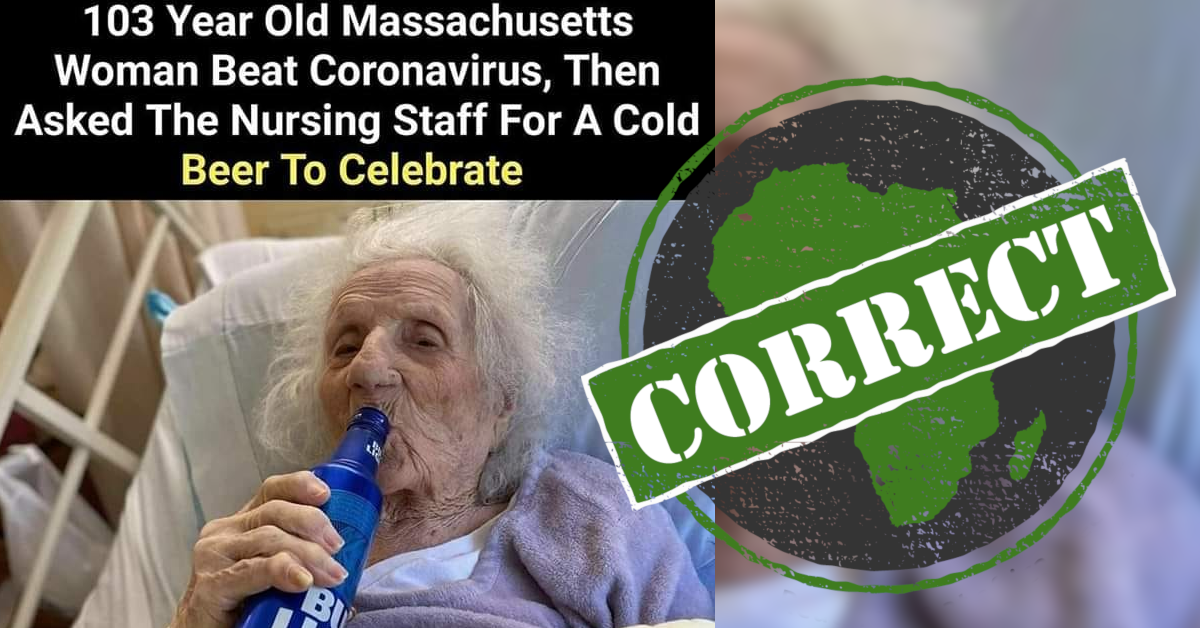“103 year old Massachusetts woman beat coronavirus, then asked the nursing staff for a cold beer to celebrate,” reads a graphic shared on Facebook in Nigeria.
It shows a frail-looking white-haired woman lying in what seems to be a hospital bed, sipping a Bud Light.
But Facebook’s fact-checking system has flagged the graphic as possibly false. Did a 103-year-old woman in the US state of Massachusetts really survive Covid-19, and then ask for a beer?

On 28 May 2020 the Massachusetts TV channel NBC Boston reported that 103-year-old Jennie Stejna had recovered from Covid-19 after she “was not expected to survive”.
“After a few days of uncertainty, nurses at the Life Care Center of Wilbraham, Massachusetts, informed the family that Jennie Stejna was on the mend,” the article says. “And they decided to celebrate with her beverage of choice – a Bud Light beer.”
Stejna’s family told CNN that ice-cold Bud Light was “one of her favourite treats”.
A blog post on the Life Care Center of Wilbraham’s website describes Stejna’s recovery.
“While we all know that this virus does not discriminate, I could not understand how or why it had chosen one of our oldest and most frail residents, Jennie Stejna – 103 years old,” wrote Lisa Persson, the centre’s director of nursing.
“And one day, I had to make that call that every medical professional just does not want to make, the call to Jennie’s family member to discuss that she may not be making it through the night.”
But, Persson says, as she walked into work one morning she “was met with a smile on the nurse’s face” because Stejna had started to eat and drink “and was cussing up a storm”, saying “I am not sick. I feel fine.” – Taryn Willows
It shows a frail-looking white-haired woman lying in what seems to be a hospital bed, sipping a Bud Light.
But Facebook’s fact-checking system has flagged the graphic as possibly false. Did a 103-year-old woman in the US state of Massachusetts really survive Covid-19, and then ask for a beer?

‘One of her favourite treats’
On 28 May 2020 the Massachusetts TV channel NBC Boston reported that 103-year-old Jennie Stejna had recovered from Covid-19 after she “was not expected to survive”.
“After a few days of uncertainty, nurses at the Life Care Center of Wilbraham, Massachusetts, informed the family that Jennie Stejna was on the mend,” the article says. “And they decided to celebrate with her beverage of choice – a Bud Light beer.”
Stejna’s family told CNN that ice-cold Bud Light was “one of her favourite treats”.
‘I am not sick. I feel fine’
A blog post on the Life Care Center of Wilbraham’s website describes Stejna’s recovery.
“While we all know that this virus does not discriminate, I could not understand how or why it had chosen one of our oldest and most frail residents, Jennie Stejna – 103 years old,” wrote Lisa Persson, the centre’s director of nursing.
“And one day, I had to make that call that every medical professional just does not want to make, the call to Jennie’s family member to discuss that she may not be making it through the night.”
But, Persson says, as she walked into work one morning she “was met with a smile on the nurse’s face” because Stejna had started to eat and drink “and was cussing up a storm”, saying “I am not sick. I feel fine.” – Taryn Willows
Republish our content for free
For publishers: what to do if your post is rated false
A fact-checker has rated your Facebook or Instagram post as “false”, “altered”, “partly false” or “missing context”. This could have serious consequences. What do you do?
Click on our guide for the steps you should follow.
Publishers guideAfrica Check teams up with Facebook
Africa Check is a partner in Meta's third-party fact-checking programme to help stop the spread of false information on social media.
The content we rate as “false” will be downgraded on Facebook and Instagram. This means fewer people will see it.
You can also help identify false information on Facebook. This guide explains how.





Add new comment